Wow,
did we get hit hard this summer! We can go years
and years without a major storm coming near Melbourne,
but Hurricane season 2004 just kept hitting us with one
enormous storm after another. On the charts below the
line indicates where the eye of the storm went, but hurricane
winds can extend for great distances around the eye.
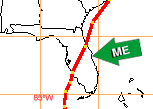 Charley 8/13/04
Charley 8/13/04 |
First
came hurricane Charley - a category
4 hurricane that reached highest sustained winds
of 145 mph (that means that there were some gusts that
were even higher). Lucky for my area, Charley was a
compact storm that moved quickly across Florida. Even
though the storm passed only 50-60 miles to the northeast
of us, we were hardly touched at all. I had a windy
night with practically no rain - less than a typical
afternoon thunderstorm.
It was
a different story on the west coast - they were beat up
pretty bad.
Charley
was a wake up call for everyone when we saw the damage
done to places like Punta Gorda. More people were willing
to evacuate a few weeks later when Frances headed our way.
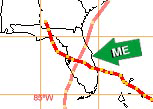 Frances
9/04/04 Frances
9/04/04 |
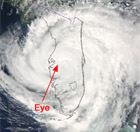 Hurricane
Frances struck on September 4. After seeing
what Charley did, people prepared more for Frances than they
might have. It has been nearly 50 years since we had been hit
by a really bad storm, and we have become pretty casual about
it, but with Frances being another category 4 we were taking
precautions. Hurricane
Frances struck on September 4. After seeing
what Charley did, people prepared more for Frances than they
might have. It has been nearly 50 years since we had been hit
by a really bad storm, and we have become pretty casual about
it, but with Frances being another category 4 we were taking
precautions.
The
news media hypes every storm as though it were going to
be catastrophic, but usually the storm diverts away from
us. When huge numbers of people evacuate and then no storm
hits, they start to feel like it isn't worth all the trouble
and expense of loading up and leaving. Even though many
of us still prefer to ride it out, a lot of people did
evacuate for Frances, including my mother and my sister
and her family. (My sister is living in a mobile home while
her house is being built, so evacuation was just good sense
for her.)
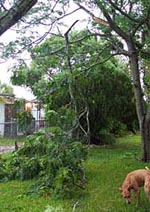 Early
in the storm large branches were breaking. Early
in the storm large branches were breaking. |
I
prepared my house for the hurricane, but
news reports of massive traffic jams and gas shortages
made me feel good about my decision to ride it out at
home. I
waited too long to gas up my car and by the day before
the storm there was no more gas available.
Twice
the size of hurricane Charley, Frances was as large as
the state of Texas and moving very, very slowly. Usually
a hurricane passes in just a few hours, but Frances started
in the afternoon, then blew all night and most of the next
day.
 Most
of the night the dog, cat and I spent in the waterbed,
napping and watching tv coverage of the progress of the
storm. A couple of times the cat disappeared only to be
found in the back of the closet. This is not a stupid cat! Most
of the night the dog, cat and I spent in the waterbed,
napping and watching tv coverage of the progress of the
storm. A couple of times the cat disappeared only to be
found in the back of the closet. This is not a stupid cat!
We had
power all night and nothing came crashing down on the roof,
so we really did quite well.
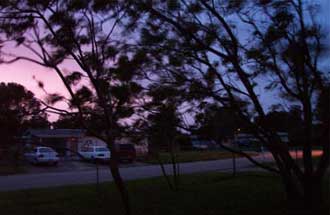 As
night fell, the wind continued to beat the trees. As
night fell, the wind continued to beat the trees.
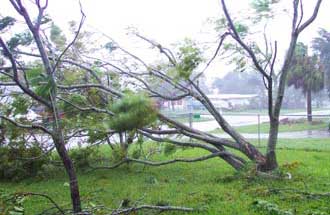
By morning several trees were
down in the yard. |
I
never lost power, but - as before - the rest of the neighborhood
lost power in the early hours of the storm. There
are just 4 or 5 houses in my development that are on
a different power line than all the others. In every
bad hurricane the others lose power for 3 or 4 weeks,
and we don't lose it at all.
Neighbors
were great about helping each other after the storms. Since
I had electrcity I made ice to replenish my neighbors ice
chests and shared my washer and dryer. Since the neighborhood
was built with natural gas hookups, families were able
to cook and take hot showers even with the power out.
<<<SideNote: I
went to the local pub to see how everyone came through
the storm. A man passing behind me took a deep breath
and told me I smelled really, really good. When those
around you haven't showered in a long time, soap and
water smells wonderful!>>> .
I lost
my TV cable and internet access for a week, and water went
out for a day, but that was really the worst of it.
Most
of my biggest shade trees went down, but they all missed
the house. The shed was another matter, but
at least with a tree leaning on it the shed didn't blow
away like so many did. My garden, however, was completely
demolished.
Click
here for photos of garden
damage.
The
next few weeks were busy with clean up, and Judy and I
made a trip to the river to see how the marsh made out.
Click here and
for here for
photos of our first rides on the river. With the water
up we were able to run on airboat trails and get out to
the cypress swamp.
A friend
came out with his chainsaw and cut up my fallen trees and
I hauled all the wood to the curb and cleaned the garden
up as best I could, but all too soon we had another hurricane
breathing down our necks.
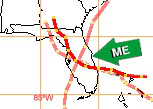 Jeanne 9/27/04
Jeanne 9/27/04 |
Jeanne
blew through on September 27. I didn't evacuate
for this one either. It's not as though I had any trees left
to fall on the house. This hurricane was only a category 3,
but being in the northeast quadrant of the storm we took a
hard hit from it. Again, I never lost power, phone or cable,
but this storm was stronger than Frances had been and I got
concerned enough to sleep in the hallway rather than in my
bedroom.
We were
worried that piles of debris would fly around in this storm,
but it wasn't a problem in our area. Since my trees had
all come down in the first storm, I didn't have too much
more yard or roof damage, but my
boat sank!
With
my Gheenoe beating up against other boats and the dock,
the engine had jumped off the transom then dragged the
back of the boat underwater by the safety cable. A friend
got the engine running again and patched up the damage
to the fiberglass, so we were able to make another trip
to the Jane Green Swamp. The cypress were so beautiful
that day! See those photos here and here.
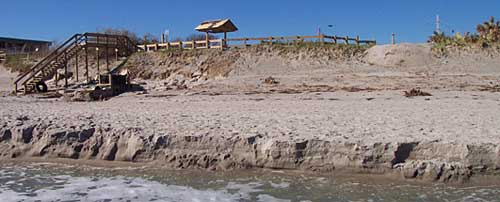
Beach
Erosion in Indialantic, Florida
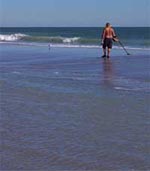 The
beach was badly eroded, and beachfront homes took a hard
blow. With the beach washed out so deeply many
people were taking the opportunity to scan the sands
with metal detectors. I heard of several finds of old
coins and jewelry from ancient shipwrecks. The
beach was badly eroded, and beachfront homes took a hard
blow. With the beach washed out so deeply many
people were taking the opportunity to scan the sands
with metal detectors. I heard of several finds of old
coins and jewelry from ancient shipwrecks.
Sections
of US-1 were washed into the Intercoastal Waterway, traffic
lights were out and hanging, road signs were down, and
some areas were without power or phones for 6-8 weeks.
We were still in better shape than those just to the south
of us.
Huge
mountains of hurricane debris still lined US-1 months after
the storms passed. Mobile homes in the Barefoot Bay area
were devastated. Docks and boats on the waterfront were
demolished.
People
have had to learn how to get the Army Corps of Civil Engineers
to put a blue tarp on their leaky roofs, how to get disaster
relief food stamps and how to fill out a FEMA application.
We've all had to file our insurance claims and search for
roofers, electricians and tree removal service that can
possibly get to us before next April.
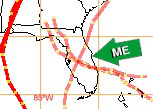 Ivan
Ivan |
By
the time hurricane Ivan threatened to hit, we were
so done! Lucky for us Ivan - an impressive
category 5 - decided to go far to the west of us, and
all we got was some windy rainy weather out of it.
Of course, when your roof is leaking you don't really
want more wind and rain, but it was still better than
another hurricane.
By this
time, families that had evacuated for three storms already
just couldn't afford the travel expenses any more. Gasoline
delivery was still unreliable, and hotels were full with
people who had lost their homes in the earlier hurricanes.
A few people who had left for Frances decided that evacuation
was not something they wanted to do again, and opted to
ride out any more storms in their own homes.
Not
that we wished hurricane Ivan on anyone else, but we all
just felt like we had enough! It was a huge relief to see
it go away from us. We are still putting things back together
(the roofer is stomping around over my head as I write
this) and thanking our lucky stars that we came through
it as well as we did. As you can see from the maps, my
town wasn't in the crosshairs of the storms, so as bad
as our damage was, others had it much, much worse.
People
up north may think that it would be horrible to live where
these storms can hit, but most of us feel like a bad storm
every 50 years is much better than snow and ice and cold
EVERY year! |


